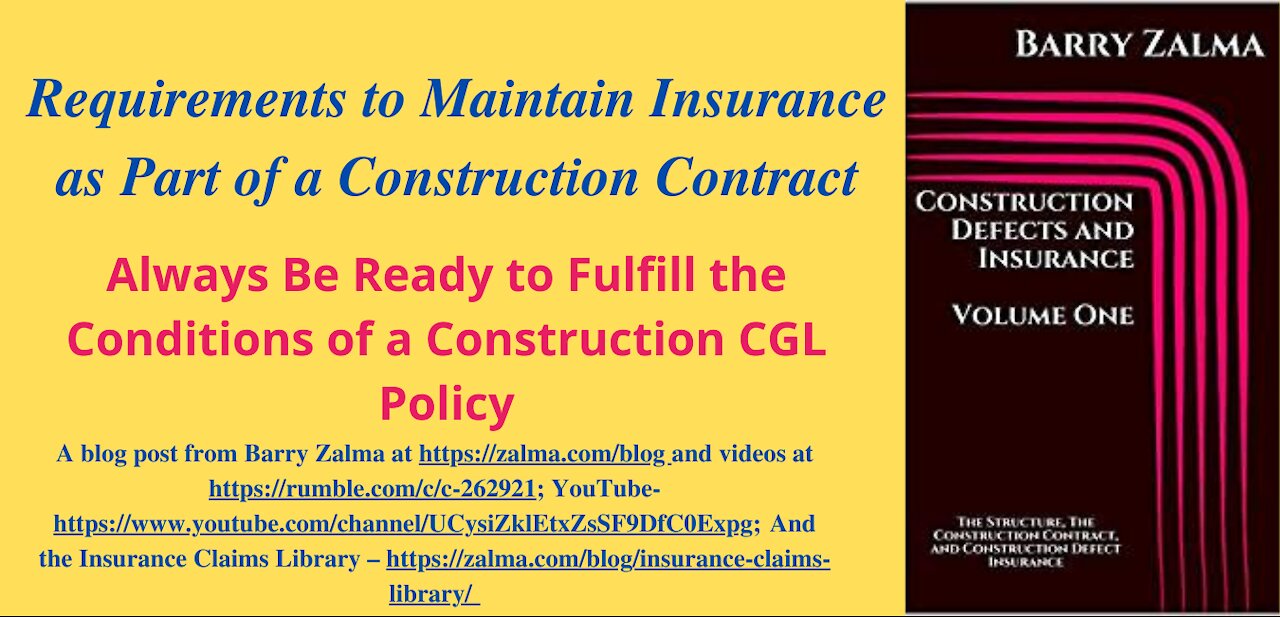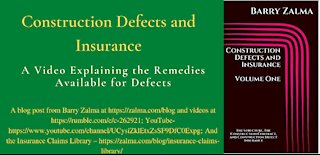Premium Only Content

Requirements to Maintain Insurance as Part of a Construction Contract
Always Be Ready to Fulfill the Conditions of a Construction CGL Policy
Insurers who insure the liability of contractors will often include in their policy a warranty that compels the general contractor to obtain proof that all its subcontractors are insured. In an important case, North American Capacity Insurance Co. v. Claremont Liability Insurance Co., Court of Appeal, Second District, 177 Cal.App.4th 272, No. B207878 (Cal.App. Dist.2 08/04/2009), dealing with a clause rarely litigated, the California Court of Appeals enforced such an agreement and issued a warning to all general contractors who do not comply with similar warranties that they may be eliminating their own coverage. In this case the warranty or condition required that the insured follow its general business practice to get hold harmless agreements and certificates of insurance from its independent contractors. The insured failed to do so and tried to enforce the contracts claiming, unsuccessfully, that it did not need to comply with the warranty.
The insurance industry also uses similar warranties that require that each independent contractor name the general contractor, the owner, and/or the developer as additional insureds.
If the general contractor does not have in its possession certificates of insurance from every independent contractor at the time the work begins and throughout the construction, the insurance is unenforceable.
Every general contractor, developer, and subcontractor that uses subcontractors must be certain to obtain the certificates required by similar policy terms. Failure to do so can be devastating.
The Court of Appeal, in reaching its decision, applied settled doctrines with regard to the interpretation of an insurance policy. Such interpretation, in California, is a question of law that the Court of Appeals can review as if it were the trial court. [Powerine Oil Co., Inc. v. Superior Court (2005) 37 Cal.4th 377, 390; AIU Ins. Co. v. Superior Court (1990) 51 Cal.3d 807, 818)] Notwithstanding that insurance policies have special features, they are still contracts to which ordinary rules of contractual interpretation apply.
© 2021 – Barry Zalma
Barry Zalma, Esq., CFE, now limits his practice to service as an insurance consultant specializing in insurance coverage, insurance claims handling, insurance bad faith and insurance fraud almost equally for insurers and policyholders.
He also serves as an arbitrator or mediator for insurance related disputes. He practiced law in California for more than 44 years as an insurance coverage and claims handling lawyer and more than 54 years in the insurance business.
He is available at http://www.zalma.com and zalma@zalma.com. Mr. Zalma is the first recipient of the first annual Claims Magazine/ACE Legend Award. Over the last 53 years Barry Zalma has dedicated his life to insurance, insurance claims and the need to defeat insurance fraud. He has created the following library of books and other materials to make it possible for insurers and their claims staff to become insurance claims professionals.
Go to the podcast Zalma On Insurance at https://anchor.fm/barry-zalma; Follow Mr. Zalma on Twitter at https://twitter.com/bzalma; Go to Barry Zalma videos at https://www.rumble.com/zalma ; Go to Barry Zalma on YouTube- https://www.youtube.com/channel/UCysiZklEtxZsSF9DfC0Expg; Go to the Insurance Claims Library – https://zalma.com/blog/insurance-claims-library/ The last two issues of ZIFL are available at https://zalma.com/zalmas-insurance-fraud-letter-2/ podcast now available at https://podcasts.apple.com/us/podcast/zalma-on-insurance/id1509583809?uo=4
-
 7:40
7:40
Barry Zalma, Inc. on Insurance Law
1 year agoLoss of Inventory by Bankruptcy
184 -
 17:52
17:52
Barry Zalma, Inc. on Insurance Law
4 years agoConstruction Defects and Insurance
139 -
 15:54
15:54
Barry Zalma, Inc. on Insurance Law
4 years agoA Video Explaining the Requirements of "Additional Insured" Provisions in a Construction Contract
97 -
 0:15
0:15
NapisLatif
3 years agoConstruction part 1
23 -
 16:24
16:24
Barry Zalma, Inc. on Insurance Law
4 years agoA Video Explaining the Construction Contract
105 -
 15:47
15:47
Barry Zalma, Inc. on Insurance Law
4 years agoA Video Explaining Construction Defects and Insurance
41 -
 2:41
2:41
KERO
4 years agoAnthem Blue Cross and Dignity Health's contract negotiations could impact your insurance plan
12 -
 2:18
2:18
KMGH
3 years agoAAA Insurance - Life Insurance
45 -
 6:00
6:00
tom43004
4 years agoNXT Sport Wing Construction #9c - Bag the Wing Part 3
301 -
 0:31
0:31
MoneyT0ks
4 years agoInsurance insurance
24